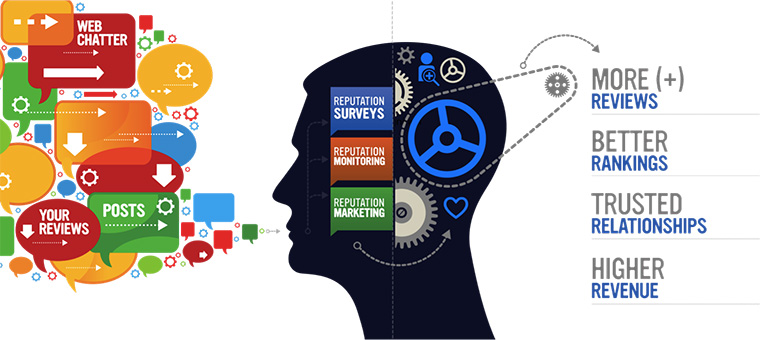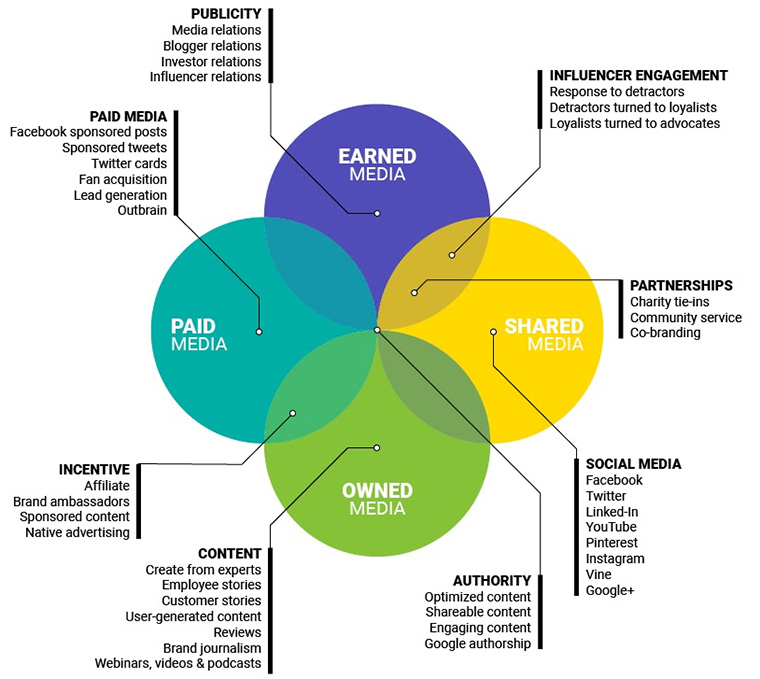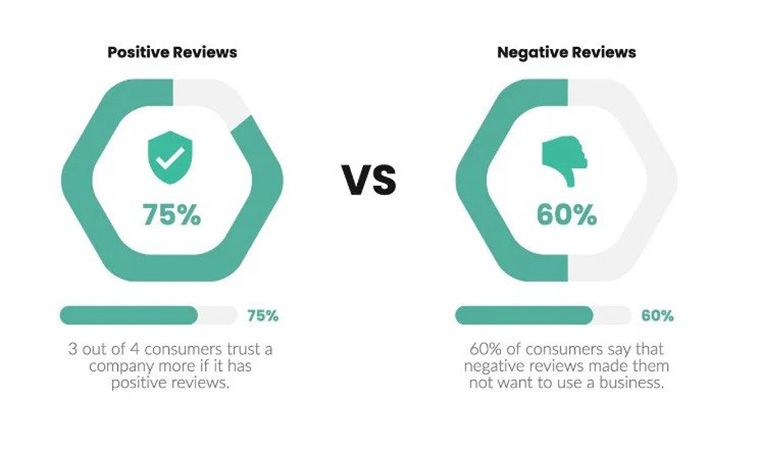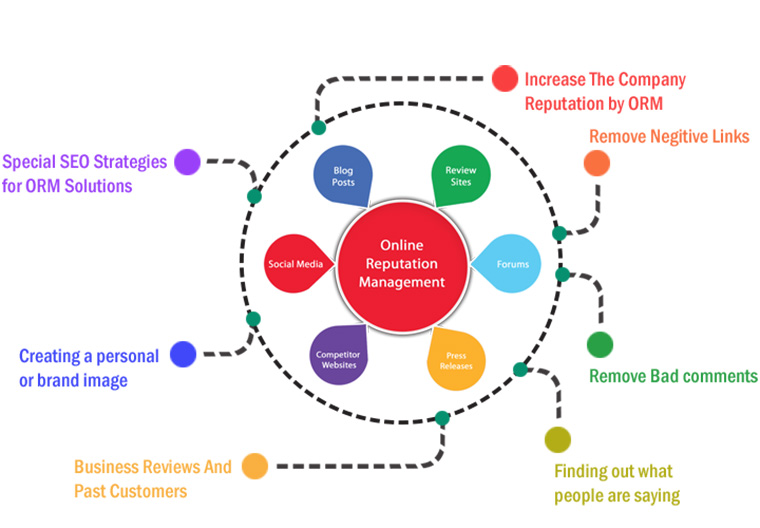Online reputation management (ORM) is where companies monitor their online reputation, and it plays a crucial part for businesses in the modern world. Creating an ORM strategy and making the most of reputation management tools can be hugely beneficial for your company – online and offline.
With the rise of social media, brand awareness and customer interaction, managing your reputation online are paramount for success.
What is online reputation management?
Online reputation management is about listening to information about your brand on the internet to find out, engage and respond to anything related to your organisation.

Image credit: The Get Smart Group
The importance of online reputation has rocketed in recent times. Customers want more from the businesses they buy from, similar to corporate social responsibility (CSR) that showcase that a company is reputable; ethically, environmentally, and financially reputable.
It includes all reviews, social media posts, Google search and Google image results and anything else. If your brand is attached to a piece of content, it forms a part of the bigger picture of your online reputation.
Anything that appears on your social media feeds, including how your company interacts with other posts, accounts, and people, are facets of your online reputation. Of course, it also includes anything that your company is doing online. It’s what customers and consumers are saying about your business.
And what your business is saying about the rest of the world. It would be best if you build trust online with your customer base to remain relevant and in the know.
How do you manage online reputation management?
You can only start managing your online reputation if you know what people say about your business. Whether positive content or negative feedback, you can only start building customer trust and your brand reputation if you know where to start.

Image credit: SEMrush via Spin Sucks
You can manage your online reputation by utilising the management tools available in the online world through Google reviews social media platforms and completing a reputation audit to know where your company’s online reputation currently stands.
There is a range of reputation management software tools available online to enable a company to monitor users’ reviews of services and products.
With information so readily available in the virtual world, these tools can help you create branded keywords to search for and pull any information about your brand that appears online without doing the leg work.
How do I improve my online reputation?
Knowing your current online reputation will give you the platform to build your public relations, connect with potential customers and start protecting your brand for the future.
1. Know your audience
Knowing your audience should be a crucial part of your entire digital marketing strategy, and the importance of online reputation relates directly to that. Public perceptions are at the tap of a touch-screen around the globe on all social networking sites, and you should be there too.
Google yourself! Conduct a regular Google Search, set up Google Alerts for your company and make the most of social listening and management tools to understand your online image.
2. Respond to people
Positive and negative content will come, so make sure that you are friendly and reachable for your customers if you are big on social media marketing.
One of the first places people turn to after a horrible customer experience is a brand’s social media accounts. So it is vital to be able to respond to negative online comments.
Not only are you able to protect your online presence by being proactive and accountable, but there is also even the opportunity for a positive online outcome.
Another critical point to take away is that don’t focus on the negative information only. Positive content and success stories are another essential component of enhancing your brand’s online reputation.
3. Be transparent
Transparency is another important aspect of building a positive online reputation. If you admit outright mistakes, you could potentially put your company’s reputation at risk. But on the same note, brands need to be proactive during crises.
Successful crisis management is critical. Your online presence is a long-term gain, and you would be protecting your brand’s long-term stability by not trying to cover up any mistakes.
It’s essential to stay on brand, keep your tone of voice consistent and maintain an active presence online to stay visible and current.
Why is it important to manage your online reputation?
The importance of effective online reputation management cannot go unspoken. If you’re serious about your company online (and let’s face it, you should be if you aren’t already), then devoting resources to online reputation monitoring is necessary.
 Image credit: Reputation X
Image credit: Reputation X
Online reputation should form a significant part of your marketing strategy. Even if you’re a local business, you can still improve customer satisfaction and increase brand awareness through your online image.
Google searches include those within a local area, so having a Google My Business page and showing up in local search queries can benefit your company.
If you’re raising brand awareness by having an online presence through social media marketing, your brand’s image ties directly to any online content that you produce.
The entire buying process has changed exponentially since the rise of the digital age. There are thousands upon thousands for each purchase a consumer is considering. Personal recommendations still exist only now.
A customer can share their experience with the entire world, and customers’ engagement with the brand they purchase from and each other is now easier than ever.
What affects online reputation?
Every time you get a brand mentioned, your company’s visibility is there for all to see. Every new potential client can see anything, and everything said about your brand online through brand searches.

Image credit: Medium
Potential customers can view negative search results or comments within minutes. Customers (and the media too) can view anything negatively written online on social media sites like Twitter or Facebook. If a news publication wrote about your business — this will show up in Google Search.
It’s important to use monitoring tools or online reputation management software to stay ahead of the game and know what shows up in search results for your online business.
Online reviews sites are a crucial indicator of your online reputation. Just one negative comment can dissuade a potential customer from a purchase. Google, Facebook, Yelp, TrustPilot and more are all reputable reviews sites that consumers frequent to educate themselves on a business online.
Building brand awareness and trust include responding to your business reviews and comments. Suppose your brand is proactive in engaging and turning a bad experience into a good one. In that case, you may remove that negative perception of your company and restore your reputation.
Summing up
Now, here’s the bottom line. An excellent online reputation means a lot to customers and could help by increasing sales, improving your business listing in search engines, and even improving your search engine ranking.
Suppose business owners utilise online management strategies, suppress harmful content, engage with customers through their social media profiles and commit to a solid content marketing plan. In that case, those negative search results will be a thing of the past.
Get in touch with BlindSeer today if you’d like to enhance your business’s online reputation, grow your organic search traffic, and get help with your marketing strategy.
David Schneider is the owner & founder of BlindSeer. He has over 8 years of experience in SEO. In addition he offers a unique viewpoint on the way SEO works with over six years previously working in Human Intelligence understanding how people think & act and how to drive people to take action.